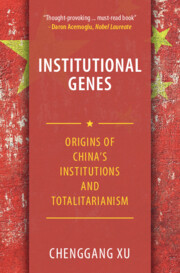Book contents
- Institutional Genes
- Reviews
- Institutional Genes
- Copyright page
- Dedication
- Contents
- Figures
- Preface and Acknowledgments
- Abbreviations
- 1 Introduction
- 2 Institutions and Institutional Genes
- 3 Property Rights as a Form of Institutional Gene
- 4 The Emergence and Evolution of the Institutional Genes of the Chinese Imperial System
- 5 The Imperial Examinations and Confucianism
- 6 The Institutional Genes of Totalitarian Ideology
- 7 Institutional Genes of Totalitarianism
- 8 The Birth of Bolshevik Totalitarianism
- 9 The Failure of Constitutional Reforms and Republican Revolution
- 10 Building China’s Bolshevik Party
- 11 Building a Totalitarian Regime
- 12 Regionally Administered Totalitarianism
- 13 The Post-Mao Reform and Its Cessation
- 14 Conclusion
- References
- Index
14 - Conclusion
Published online by Cambridge University Press: 03 June 2025
- Institutional Genes
- Reviews
- Institutional Genes
- Copyright page
- Dedication
- Contents
- Figures
- Preface and Acknowledgments
- Abbreviations
- 1 Introduction
- 2 Institutions and Institutional Genes
- 3 Property Rights as a Form of Institutional Gene
- 4 The Emergence and Evolution of the Institutional Genes of the Chinese Imperial System
- 5 The Imperial Examinations and Confucianism
- 6 The Institutional Genes of Totalitarian Ideology
- 7 Institutional Genes of Totalitarianism
- 8 The Birth of Bolshevik Totalitarianism
- 9 The Failure of Constitutional Reforms and Republican Revolution
- 10 Building China’s Bolshevik Party
- 11 Building a Totalitarian Regime
- 12 Regionally Administered Totalitarianism
- 13 The Post-Mao Reform and Its Cessation
- 14 Conclusion
- References
- Index
Summary
The final chapter reiterates the challenges posed by totalitarianism. By conducting coherent theoretical and empirical research into the origins and expansion of totalitarianism, this work strives to address these significant challenges that Mises warned about decades ago. This chapter summarizes the key insights drawn from both the empirical evidence and the theoretical framework of institutional genes that constitute a comprehensive methodological approach. The literature review distinguishes this book from other works in the fields of China studies, institutional analysis, and social science methodology. The two most extensive sections of the chapter examine the institutional genes and their evolution in Taiwan and in the former Soviet Union and Eastern Europe (FSU-EE). The former section sheds light on the pivotal role the institutional genes played in Taiwan’s transition from authoritarian rule to constitutional democracy, while the latter section explains the collapse of the totalitarian regimes in the FSU-EE countries and their divergent institutional transformations. The chapter also highlights the implications of the transitions in Taiwan and the FSU-EE countries for China’s future transformations.
Keywords
Information
- Type
- Chapter
- Information
- Institutional GenesOrigins of China's Institutions and Totalitarianism, pp. 658 - 724Publisher: Cambridge University PressPrint publication year: 2025
